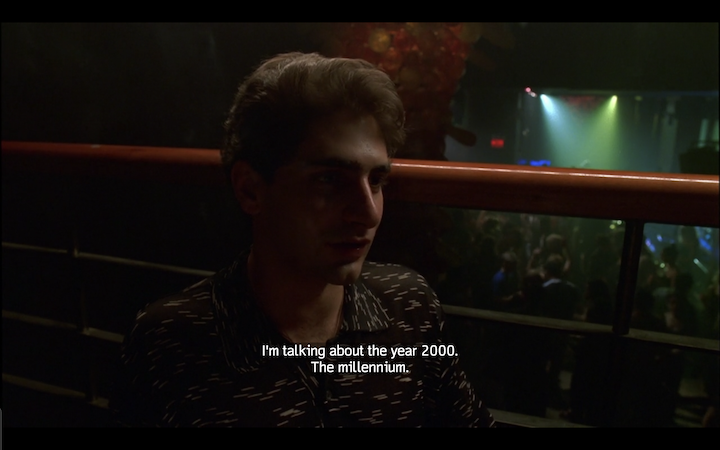3:25:22
Last night on the cusp between the final episode of season 1 of The Sopranos and the first episode of season 2 of The Sopranos, which is to say, from the 20th century to the new millennium, I had this eerie realization, almost like a flashback, that the first year of this show--1999--is before 9/11, before the Twin Towers fell, before the Patriot Act, before the War on Terror, before the internet takeover, before the iPhone (all those perfectly timed payphone calls on the show), before the masculinity upgrade from physical brutality to algorithmic poison, before the COVID-regime. You could say, yeah, but there are many movies and television shows that precede these events. Yes, there are. But it seems to me that what The Sopranos represents, captures, and epitomizes is precisely this post-millennial precedence. Hence the second-wind of The Sopranos during COVID lockdown.
The Sopranos is haunted by the final specter of analog reality, by the end of materiality--all those bags of cold hard cash (especially right now, as we wipe out the dollar and slip into invisible, artificial digital currency), sifting through overripe dollars, like flour overflowing in a 19th century basket. The American fin de siècle as industrial wheat. The end of the harvest. Everyone is a psycho on the show, but almost no one is a liar--at least that was true in the first season. Today everyone is a psycho and a liar. So you don't even know. Worse, you have been trained not to see it, or to see your crimes as virtues in the social media echo chamber. You are miming and perfecting your own reflection in the mirror of the internet screen. Identity is now the equivalent of all those endless makeup tutorials on YouTube.
Remove the blood and the paper dollars, introduce the predatory algorithm, paint, shade, and contour your face, teaching others to do the same as though their lives depended on it. Your fake face rules the world. All the potbellied male violence on The Sopranos is, ironically, a kind of socio-political vérité. Flesh and blood stamina, warts and all. Strangely, no one's face is hiding anything. Lorraine Bracco's therapist is the last vestige of a collective conscience, now long gone. A voice of reason. Yes, it's just a TV show, an invention, which can be anything. Any dream. Any reality. Any fantasy. And yet, the series continues to be a zeitgeist that no one can let go of or forget. That won't let go of us. Why? Besides lost time, what is its unforgettable archeology? What does the world on that screen give you that the screen world on today's screens can't? The answer is in The Police song below--Spirts in the Material World. All that is wrong has been hidden until now.
In an interview from the early 2000s, Sopranos creator David Chase told Peter Bogdanovich that unlike other beloved mob films, which are period pieces, the Sopranos takes place in the present. It's true, but it's a present that is about the ending of the past. And the introduction of a future that will wipe out everyone and everything we've ever known to be true. Chase: "The show is about how life has become more and more artificial, or something."
Coffee & COVID, March 24:
"It’s all going great! You don’t think the same geniuses who came up with a pandemic to stop an election would go for a world war to stop an election, do you?"
